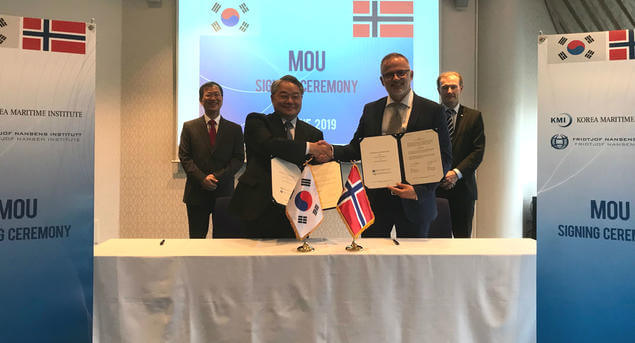South Korea and Norway recently held an online forum to promote their Arctic cooperation. “Women in the Arctic” was held online on Oct. 19 by the Norwegian Embassy in Seoul, the Korea Polar Research Institute (Kopri), and the Korea Center for Women in Science, Engineering, and Technology.
Female scientists from Norway and South Korea joined the online forum to share their latest research on the Arctic region, oceans, and fisheries. Scientists from both nations said that, more than once, their research has led to collaborations between institutions from the two countries.
From January 2021 onwards, South Korea will be among the prioritized countries in Norway’s Panorama strategy. Through the Panorama strategy, Norway aims to increase the scope of its cooperation on higher education, primarily by expanding existing research cooperation.
The addition of South Korea for 2021 comes as no surprise, considering that the Republic of Korea is Norway’s second-largest trading partner in Asia. South Korean President Moon Jae-in also visited Oslo in June 2019 for a state visit to Norway that was aimed at boosting bilateral ties in new energy, maritime affairs, and the Arctic. The visit marked the 60th anniversary of the establishment of diplomatic relations between Norway and South Korea and represented the first Korean state visit to Norway.
Other countries to join South Korea on this list in January 2021 are the United States and Canada. This addition will make it easier for South Korean institutes and researchers to apply for combined research activities.
Currently, India is one of six priority countries identified by Norway for cooperation on higher education and research. Thematic areas relating to the oceans, such as climate change, the environment, marine research, the maritime sector, and polar research, are at the heart of this cooperation. Other countries on the priority list for 2016-2020 are Brazil, China, Japan, Russia and South Africa.
Several other countries have interests in the Arctic. The United States, Canada, Denmark, Finland, Iceland, Norway, Russia and Sweden, are the eight nations surrounding the Arctic. They are all currently pushing for ownership of the region's frozen seas. Recently, Russia’s legal information portal released a statement indicating President Vladimir Putin’s approval of a development strategy and national security provisions for the Federation’s Arctic zone until 2035.
Putin had initially announced his plan to endorse a new 15-year development strategy for the Russian Arctic in April 2019, which includes integrating measures in place by state and national programs, infrastructure investment plans, and development programs for Arctic cities and regions. Earlier this year, Putin signed off on the Kremlin’s Arctic strategy, a document authored by the Ministry for the Development of the Russian Far East and the Arctic, which included the administration’s main priorities and objectives in the region, as well as mechanisms of state policy execution. Simultaneously, the State Duma, the lower house of the Russian Parliament, approved new tax release laws to ease investments in the region.
Korea and Norway Strengthen Arctic Cooperation
Against the backdrop of a looming climate crisis, more and more countries, like Norway and South Korea, are expanding polar research cooperation and redeveloping their Arctic strategies. Read more.
November 3, 2020

SOURCE: Karoline H. Flåm, 2019
